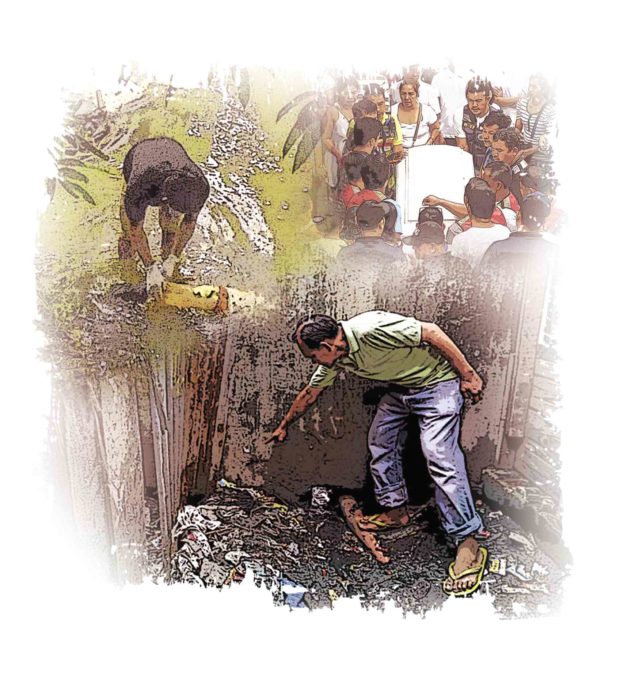
PHOTO COMPOSITION BY JERITO DELA CRUZ
Malacañang believes “malignant elements” were behind the recent killings of young people to sabotage President Rodrigo Duterte’s war on drugs, but opposition lawmakers said the claim was intended to shift responsibility for the deaths away from the administration.
Presidential spokesperson Ernesto Abella said on Saturday that Mr. Duterte’s campaign to wipe out the illegal narcotics trade affected “powerful narcopoliticians and deep pocketed drug lords who flourished prior to this administration.”
These quarters were expected to discredit the government in the eyes of the people, he said.
“It should not come as a surprise that these malignant elements would conspire to sabotage the President’s campaign to rid the Philippines of illegal drugs and criminality, the centerpiece program of the administration, to succeed, which may include creating scenarios stoking public anger against the government,” Abella said.
“The recent killings apparently targeting the youth should be viewed with suspicion and urgency,” he said.
The killings of Kian delos Santos, 17, Carl Arnaiz, 19, and Reynaldo de Guzman, 14, triggered public outrage.
The President on Friday said that the killings were “deliberate” and meant to be blamed on the police. Police shoot in self-defense and do not bother wrapping the head of a slain suspect, he said, citing the case of De Guzman.
“Someone is sabotaging them,” he said.
There are no suspects yet in the killing of De Guzman, whose body was found floating in a creek in Gapan, Nueva Ecija, with dozens of stab wounds days after he and Arnaiz went missing.
Official investigations, however, found that police officers were responsible for the intentional killing of Delos Santos.
The National Bureau of Investigation and the Public Attorney’s Office filed separate murder and evidence planting charges against four Caloocan City police officers in the killing of Delos Santos last month.
Officers admitted killing Delos Santos, an alleged drug runner, and Arnaiz, an alleged robber, but said they did so in self-defense.
Sen. Leila de Lima, a staunch critic of Mr. Duterte, rejected his claim of sabotage.
“Now that public opinion is against the killings of these minors, he reangles the murders he has sanctioned as sabotage,” De Lima, who is detained in Camp Crame on drug charges, said in a statement.
“Wrap your minds around [the President’s claim],” she said. “Discombobulate your brains until it makes sense. But it won’t because this is the logic of the sociopath, where empathy is not even an itch that the deranged President can feel.”
Sen. Antonio Trillanes IV, another strident critic of the President, said Mr. Duterte was “backpedalling” because of the growing outcry over the deaths.
Another opposition lawmaker, Akbayan Rep. Tom Villarin, a member of the independent bloc in the House of Representatives, said Mr. Duterte’s statements about the killings were “preposterous and absurd.”
He said that as President, Mr. Duterte had almost absolute control over the government, including the security sector, and so much intelligence funds that could be used to find the perpetrators of extrajudicial killings (EJKs).
“It’s the height of irony to blame others while his PNP (Philippine National Police) under General Ronald dela Rosa has done nothing to curb the EJKs nor has the DOJ (Department of Justice) prosecuted people responsible for thousands of murders,” Villarin said.
However, Sen. Richard Gordon, who led an investigation of alleged EJKs last year, said a sabotage “to destabilize” Mr. Duterte’s war on drugs was possible.
Commission on Human Rights (CHR) chair Chito Gaston said his agency’s monitoring and evaluation of drug-related killings “has reached a point where we can say there may be a pattern.”
Gaston spoke with reporters this week at the House of Representatives where he sought an increase in the CHR’s budget amid talks that it would be given zero-peso allocation for 2018.
“These consecutive killings of boys that must be answered by law enforcement, which CHR has monitored, will probably support our argument as to why it is not the time to give the CHR zero budget, but instead to increase it, so we may adequately respond to new developments,” he said.
Liberal Party senators said they would block a proposed massive increase in the PNP budget for the antidrug campaign unless it presented alternatives to the killings that have claimed thousands of lives.
For 2018, the PNP has earmarked P900 million from P20 million this year for President Duterte’s war on drugs.
“Filipinos deserve better solutions to the drug menace. We should be capable of developing solutions that leverage on the strength of our families, our communities and our passionate young Filipinos instead of this over-reliance on violence,” Sen. Bam Aquino said.